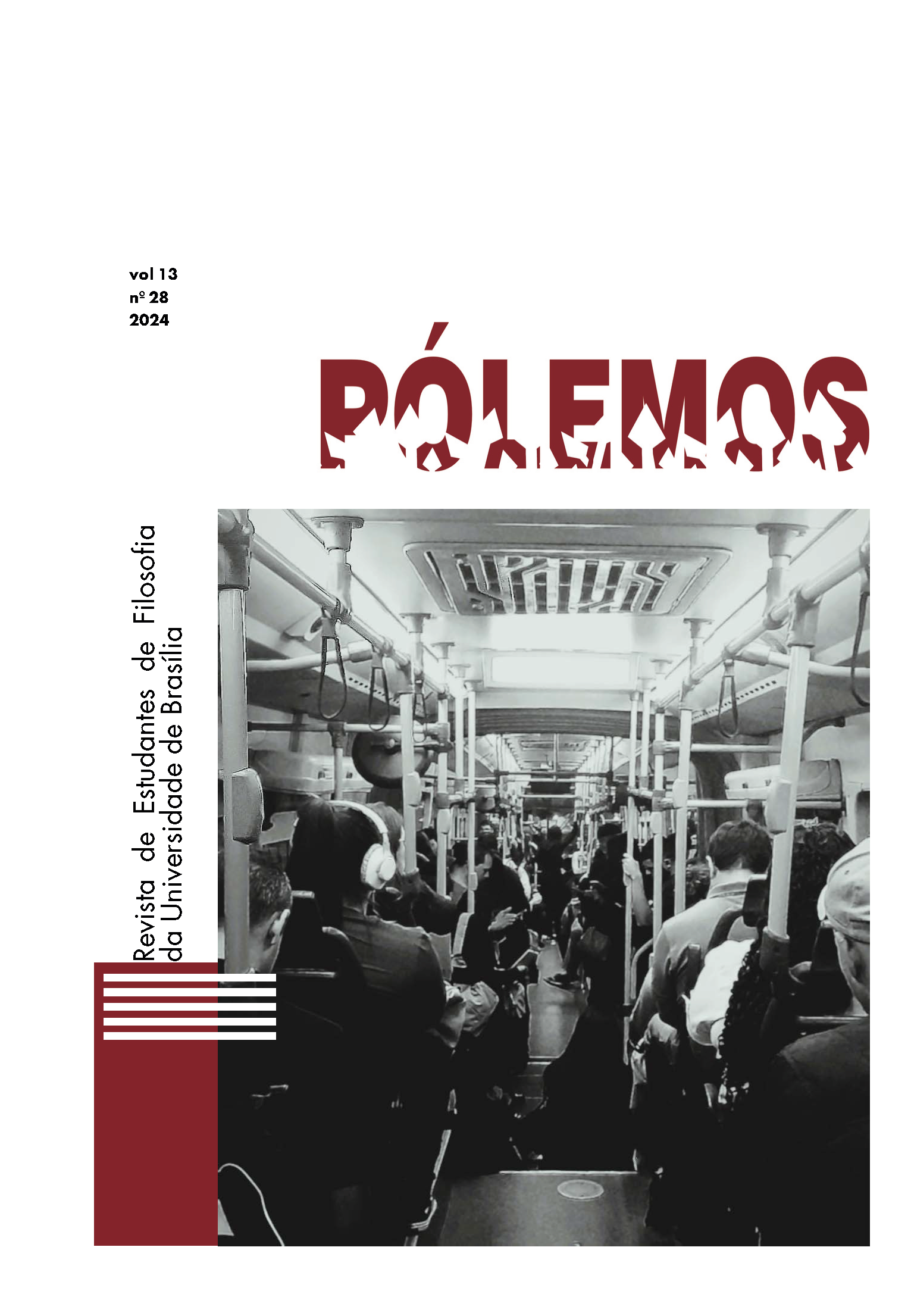O PONTO DE VISTA GERAL DE HUME E SEU PAPEL NOS JUÍZOS MORAIS
a busca por imparcialidade, estabilidade e objetividade
DOI :
https://doi.org/10.26512/pl.v13i28.53636Mots-clés :
David Hume. Ponto de vista geral. Juízos morais.Résumé
A teoria moral de Hume é famosa pela centralidade que confere aos sentimentos. Mas isso não faz dele um ingênuo escravo das paixões. Este trabalho investiga o papel desempenhado pelo ponto de vista geral humeano nos juízos morais. O trabalho possui três seções. A primeira apresenta um quadro do sentimentalismo moral humeano. A segunda investiga o conceito de ponto de vista geral, seus principais elementos e sua função na correção dos juízos morais. A última aborda o princípio da humanidade e sua importância para a “estabilidade” intersubjetiva dos juízos morais. O ponto de vista geral “corrige” os elementos particulares dos sentimentos situados: os juízos se libertam da seletividade e da parcialidade naturais e alcançam estabilidade e objetividade. A importância do ponto de vista geral reside na sua possibilidade de regular a natureza contraditória dos sentimentos. Ele confere, na medida da possibilidade humana, imparcialidade, estabilidade e objetividade aos juízos morais.
Téléchargements
Références
AGOSTA, Lou. A Delicacy of Empathy: Hume's Many Meanings of Sympathy. Psicol. pesq., v. 8, n. 1, p. 3-15, jun. 2014. DOI: https://doi.org/10.5327/Z1982-1247201400010002.
BAIER, Annette C. A Progress of Sentiments: Reflections on Hume’s Treatise. Cambridge, MA: Harvard University Press, 1991.
BERRY, Christopher. Social Theory of the Scottish Enlightenment. Edinburgh: Edinburgh University Press, 2001.
BROWN, Charlotte R. Moral Rationalism, Sentimentalism, and Sympathy. In: RADCLIFFE, Elizabeth F. (Ed.). A Companion to Hume. Malden, USA; Oxford, UK; Carlton, AU: Blackwell Publishing, 2008, pp. 219-239.
BUCKLE, Stephen. Hume in the Enlightenment Tradition. In: RADCLIFFE, Elizabeth F. (Ed.). A Companion to Hume. Malden, USA; Oxford, UK; Carlton, AU: Blackwell Publishing, 2008, pp. 21-37.
CAMPELLO, Filipe. Crítica dos afetos. Belo Horizonte: Autêntica Editora, 2022.
COHON, Rachel. Hume’s morality: feeling and fabrication. Oxford: Oxford University Press, 2008.
COLLIER, Mark. Hume’s Theory of Moral Imagination. History of Philosophy Quarterly, v. 27, n. 3, p. 255-273, 2010. Disponível em: https://www.jstor.org/stable/27809509. Acesso em: 27 jan. 2024.
GILL, Michael B. The British Moralists on Human Nature and the Birth of Secular Ethics. Cambridge: Cambridge University Press, 2006.
HAAKONSSEN, Kurt. Science of a Legislator: the Natural Jurisprudence of David Hume and Adam Smith. Cambridge: Cambridge University Press, 1981.
HARMAN, Gilbert. Explaining Value and Other Essays in Moral Philosophy. Oxford: Oxford University Press, 2000.
HUME, David. Investigações sobre o entendimento humano e os princípios da moral. São Paulo: Editora UNESP, 2004.
HUME, David. Tratado da natureza humana: uma tentativa de introduzir o método experimental de raciocínio nos assuntos morais. São Paulo: Editora UNESP, 2009.
IRWIN, Terence. The Development of Ethics: a Historical and Critical Study. Volume II: From Suarez to Rousseau. Oxford: Oxford University Press, 2008.
JAFFRO, Laurent. Science de la nature humaine ou science de l’esprit humain? Le d´ebat écossais et son impact sur la psychologie philosophique en France. Corpus: revue de la philosophie, Fayard, 2009, 57, p. 101-124. Disponível em: https://shs.hal.science/halshs-00380568v1. Acesso em: 26 jan. 2024.
JAFFRO, Laurent. Hutcheson sobre a importância de ser desinteressado. Um encômio a Shaftesbury?. Discurso, v. 1, n. 44, p. 79-96, 2014. DOI: https://doi.org/10.11606/issn.2318-8863.discurso.2014.89086.
KORSGAARD, Christine M. The Constitution of Agency: Essays on Practical Reason and Moral Psychology. Oxford: Oxford University Press, 2008.
MACKIE, J. L. Hume’s moral theory. London and New York: Routledge, 1980.
MCARTHUR, Neil. Cosmopolitanism and Hume’s general point of view. European Journal of Political Theory, v. 13, n. 3, p.321–340, 2014. DOI: https://doi.org/10.1177/1474885113492728.
NAGEL, Thomas. The Possibility of Altruism. Princeton, New Jersey: Princeton University Press, 1970.
RADCLIFFE, Elizabeth F. (Ed.). A Companion to Hume. Malden, USA; Oxford, UK; Carlton, AU: Blackwell Publishing, 2008.
RAPHAEL, D.D. The Impartial Spectator: Adam Smith’s Moral Philosophy. Oxford: University Press, 2007.
RICK, Jon. Hume's and Smith's Partial Sympathies and Impartial Stances. Journal of Scottish Philosophy, v. 5, n. 2, p. 135-158, 2007. DOI: https://doi.org/10.3366/jsp.2007.5.2.135.
SAYRE-MCCORD, Geoffrey. On Why Hume’s ‘General Point of View’ Isn’t Ideal – and Shouldn’t Be. Social Philosophy & Policy, v. 11, n. 1, p. 202–228, 1994. DOI: https://doi.org/10.1017/S0265052500004350.
STEWART, Carole. The Moral Point of View. Philosophy, v. 51, n. 196, p. 177-187, 1976. Disponível em: https://www.jstor.org/stable/3750215. Acesso em: 27 jul. 2023.
STROUD, Barry. Hume. London and New York: Routledge & Kegan Paul, 1977.
TAYLOR, Jacqueline A. Virtue and the Evaluation of Character. In: TRAIGER, Samuel. (Ed.). The Blackwell Guide to Hume’s Treatise. Oxford: Blackwell, 2006, pp. 276–95.
TAYLOR, Jacqueline A. Reflecting Subjects: Passion, Sympathy, and Society in Hume’s Philosophy. Oxford: Oxford University Press, 2015.
TRAIGER, Samuel. (Ed.). The Blackwell Guide to Hume’s Treatise of Human Nature. Oxford: Blackwell, 2006.
WRIGHT, John P. Hume’s ‘a Treatise of Human Nature’: an introduction. Cambridge: Cambridge University Press, 2009.
Téléchargements
Publié-e
Comment citer
Numéro
Rubrique
Licence
© PÓLEMOS – Revista de Estudantes de Filosofia da Universidade de Brasília 2024

Cette œuvre est sous licence Creative Commons Attribution - Pas d'Utilisation Commerciale - Pas de Modification 4.0 International.
Todos os trabalhos que forem aceitos para publicação, após o devido processo avaliativo, serão publicados sob uma licença Creative Commons, na modalidade Attribution-NonCommercial-NoDerivatives 4.0 International Public License (CC BY-NC-ND 4.0). Esta licença permite que qualquer pessoa copie e distribua a obra total e derivadas criadas a partir dela, desde que seja dado crédito (atribuição) ao autor / Ã autora / aos autores / às autoras.


